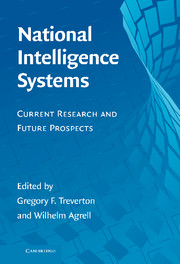Book contents
- Frontmatter
- Contents
- Preface
- 1 Introduction
- PART 1 DEFINING THE FIELD, ITS THEORY, HISTORIOGRAPHY, AND CHANGES AFTER THE COLD WAR
- PART 2 RESEARCH ON NEW CHALLENGES, METHODS, AND THREATS
- PART 3 INTELLIGENCE, POLITICS, AND OVERSIGHT
- 8 The Intelligence–Policy Maker Relationship and the Politicization of Intelligence
- 9 Oversight of Intelligence: A Comparative Approach
- 10 The Limits of Avowal: Secret Intelligence in an Age of Public Scrutiny
- 11 The Science of Intelligence: Reflections on a Field That Never Was
- Index
- References
10 - The Limits of Avowal: Secret Intelligence in an Age of Public Scrutiny
from PART 3 - INTELLIGENCE, POLITICS, AND OVERSIGHT
Published online by Cambridge University Press: 05 June 2012
- Frontmatter
- Contents
- Preface
- 1 Introduction
- PART 1 DEFINING THE FIELD, ITS THEORY, HISTORIOGRAPHY, AND CHANGES AFTER THE COLD WAR
- PART 2 RESEARCH ON NEW CHALLENGES, METHODS, AND THREATS
- PART 3 INTELLIGENCE, POLITICS, AND OVERSIGHT
- 8 The Intelligence–Policy Maker Relationship and the Politicization of Intelligence
- 9 Oversight of Intelligence: A Comparative Approach
- 10 The Limits of Avowal: Secret Intelligence in an Age of Public Scrutiny
- 11 The Science of Intelligence: Reflections on a Field That Never Was
- Index
- References
Summary
Compare these two quotations. First, testimony to the Congressional Oversight Committee from the Director of the Central Intelligence Agency (CIA): “We can't break the law.…You just can't go to that place.…I actually said fairly publicly to our workforce that, as director, I have to be certain that that which I'm asking a CIA officer to do is consistent with the Constitution, the laws and the international treaty obligations of the United States.…If I can't say that, I can't ask an officer to do it”. Second, as put to the British author Bickham Sweet-Escott on his recruitment into the British Wartime Special Operations Executive: “I can't tell you what sort of a job it would be. All I can say is that if you join us, you mustn't be afraid of forgery, and you mustn't be afraid of murder”. The first quotation is from 2007, the second from 1940. Almost 70 years and a revolution in intelligence work separate these two attitudes. A question hangs over the quotations: Can the acknowledged, democratically accountable, independently overseen, and publicly Web-visible government intelligence agencies that we now have, operating to a strict ethical code, be expected to be able to collect worthwhile secret intelligence and engage in effective secret action?
The question is not academic. Academic analysis, however, should help answer the opening question.
- Type
- Chapter
- Information
- National Intelligence SystemsCurrent Research and Future Prospects, pp. 235 - 264Publisher: Cambridge University PressPrint publication year: 2009
References
- 2
- Cited by



